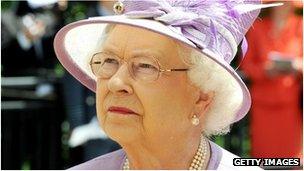Queen costs taxpayers extra £200,000
- Published
- comments

The cost to the taxpayer of supporting the British monarchy has risen by £200,000 in the last financial year, Buckingham Palace accounts show.
The Queen's official expenditure totaled £32.3m in 2011/12 - up 0.6% from £32.1m in 2010/11.
But the palace said expenditure had fallen by 26% in real terms from a level of £36.5m three years ago.
Last year saw a fall in the Civil List, most of which pays wages, but royal travel and upkeep of residences rose.
Sir Alan Reid, keeper of the privy purse, said: "When the chancellor of the exchequer announced his plans for public expenditure to reduce by 25% in real terms over a four-year period, the Queen was very keen that the Royal Household should play its part in reducing its expenditure accordingly."
The cost of running the palace press office, official website and providing public information fell from £500,000 2010/11 to £400,000 last year.
Spending on royal residences and other buildings rose from £11.9m to £12.2m, while the cost of air and rail travel increased from £6m to £6.1m.
The accounts show travel undertaken by the Duke of York in his former role as UK trade envoy, with seven trips last year costing a total of £358,000.
These included an £81,000 visit to Saudi Arabia, and a trip to Thailand, Malaysia and China that cost £72,000.
Prince Andrew stepped down from the envoy role last year.
BBC royal correspondent Peter Hunt said: "The price of royal travel is what tends to excite attention year in, year out."
'Hidden' cost
The accounts do not show the cost of security for the Royal Family.
The campaign group Republic, which calls for an elected head of state, estimates that the total cost of the monarchy is £202.4m a year, which breaks down to £12.7m on each of the 16 working royals.
Even based on Buckingham Palace's figures, Republic says that taxpayers are spending five times more on each member of the Royal Family than on a front-line soldier in Afghanistan.
"The actual, real cost is still being hidden," said Republic chief executive Graham Smith.
"The accounts are not being properly opened up to scrutiny."
But Thomas Mace Archer Mills, chairman of the British Monarchist Society, said that the Royal Family had slashed its expenditure from more then £80m in the mid-1980s.
"Her Majesty is a frugal person, and she has proved so by reducing her cost to the public," he said.
If the monarchy was abolished, costs would remain - such as for security - for whatever head of state replaced it, he said.
"The current polls have shown that the Queen and the Royal Family are as popular as they have ever been since she came to the throne," he added.
Jubilee year
From next year the Royal Family will be funded by a Sovereign Grant, set at 15% of profits made by the Crown Estate two years previously.
This funding model replaces the system under which the Queen receives money from three different government departments.
It is seen as the biggest change to the financing of the Royal Family for 250 years.
The grant is expected to be about £34m in the first year, in line with recent royal spending.
Before the new formula kicks in, a grant of £31m has been set for 2012/13.
"Expenditure during this Diamond Jubilee year will require the use of reserves as the first year of the Sovereign Grant provides for funding of only £31m," said Sir Alan.
- Published18 October 2011
- Published4 July 2011
- Published1 July 2011
- Published22 June 2010